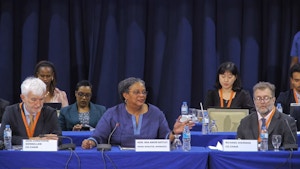#COP29 Berita

Karbon & Iklim
Domestic implementation key to Article 6-led financing for Asia Pacific amid growing trade barriers: EcoSecurities
Studio EB
The operationalisation of Article 6 at COP29 can be a critical lever to enable Asia Pacific’s transition to a low-carbon economy. Fragmented standards across countries, however, still present implementation challenges amid global geopolitical shifts.

Kebijakan & Keuangan
What is the ‘Tropical Forest Forever’ fund and will it work?
Led by COP30 host Brazil, 12 countries are finalising a fund that aims to raise US$125 billion for tropical forest conservation and launch at the November climate summit.

Kebijakan & Keuangan
Concerns emerge over scaled down loss and damage fund
The global fund’s fifth meeting closed with the amount available to help vulnerable nations cope with climate risk reduced by more than US$50 million.

Kebijakan & Keuangan
A ‘mosaic’ of abatement strategies needed to cut global methane emissions amid US backtrack
Studio EB
There may be hope for methane abatement with recently proposed guidelines and funding pledges. But with the United States back-pedalling on climate policies, will they be enough?
Karbon & Iklim
COP30 is in good hands with Brazil: Christiana Figueres
Kebijakan & Keuangan
Analysis: Nearly a tenth of global climate finance threatened by Trump aid cuts
Kebijakan & Keuangan
China and India central to climate action: COP30 president
#COP29 Opini

Kebijakan & Keuangan
Can COP30 succeed where COP29 failed?
There is scepticism around climate finance through private investments, and if private finance is to play a bigger role, policy reforms ahead of this year’s COP30 are needed. Alternatively, could the G20 or BRICS lead on climate finance?

Kebijakan & Keuangan
A critical year for finance could shape fairer, more sustainable mining
Five looming decisions in the development finance world could help to mitigate environmental and social risks of transition minerals, write Boston University researchers.

Kebijakan & Keuangan
Getting green investment where it’s needed most
Public development banks must spearhead a systemic overhaul of global finance to ensure climate funding reaches the most vulnerable and accelerates the green transition.

Kebijakan & Keuangan
Southeast Asia’s frustration with the state of climate finance
The financing gap is huge, but time is short. Given the inadequacy of a promised new climate finance goal, Southeast Asia should look beyond UN-led conferences to crowd in other sources of capital to tackle the climate crisis.
Kebijakan & Keuangan
It’s time for a UN ‘universal declaration on nature’
Karbon & Iklim
Ban solar geoengineering
Pangan & Agrikultur
Synergising digital tech and climate tech to enhance Asean climate action
Pangan & Agrikultur
Meat and dairy’s methane emissions must be on the table in 2025
#COP29 Podcasts

UN climate report authors need to commit to the integrity of assessment processes while working with governments with differing interests. Dr Theresa Wong tells the Eco-Business podcast why the stakes are high to get climate science right.
#COP29 Rilis Pers

UN Trade and Development (UNCTAD)
Financing for development: Reforming global systems to drive progress

UN Environment Programme (UNEP)
World must pull together to build a fairer, more sustainable planet: UNEP annual report

UN Trade and Development (UNCTAD)
Small island nations: How oceans offer solutions to climate change







